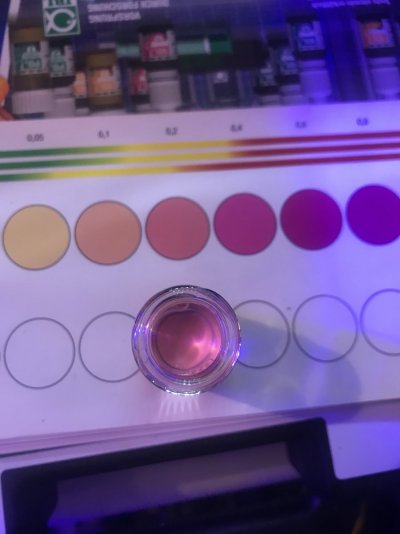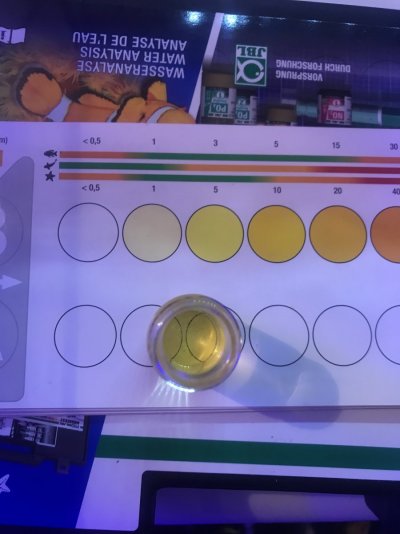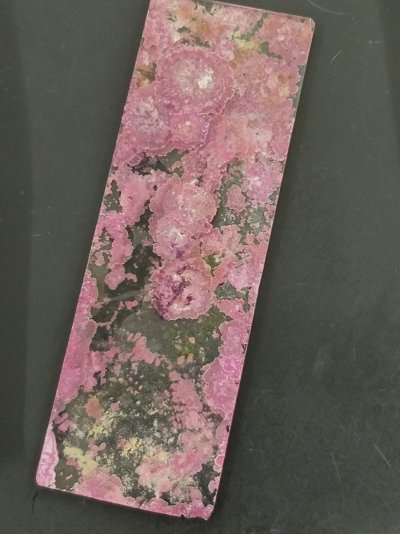I don't know if the 17 times longer part is accurate, if comparing to me. I had 5 rocks and rinsed each for approximately 1 minute. That's probably my fault if anyone misunderstood what I did time wise.
Thanks for compiling it for me!
Follow along with the video below to see how to install our site as a web app on your home screen.
Note: This feature may not be available in some browsers.
I don't know if the 17 times longer part is accurate, if comparing to me. I had 5 rocks and rinsed each for approximately 1 minute. That's probably my fault if anyone misunderstood what I did time wise.
No worriesThanks for compiling it for me!


Wish I knew what was going on here, but I’m sure you’re all doing a fantastic job!!

Between which days did you the rinse?Test run 4.2 filtered in 24 hours
Day 1
2.2ppm added and 0,2 left in 24 hours
Day 2
2.4ppm added and zero at 18 hours
day 3
3.6ppm added and it is zero now 24 hours later.
(Don’t know the exact time that it was depleted)
test undertaken:
rock submerged for 8.34 minutes
85% water change
tank disassembled and scrubed
lights left on
lots of organic die off from dead critters
DIFFERENCE FROM THE OTHER TEST
15% water was kept
Light
Dead organic matter
Exposure to tap water of 17 TIMES LONGER (described as “extreme” for most on the tread)
Interesting I was just testing no2 as @Lasse likes it, and for my surprise it’s the first time since testing started that I’ve observed a no2 of 0.2 and nitrates of <5. Something must be off I was expecting a rise in both tbh.


I started the clock on day1 as soon as ammonia was added.Between which days did you the rinse?
I have an explanation for that - but you will not like it
Your earlier measurements of Nitrate was probably interfered by your nitrite readings. I will guess that if you take it easy now and measure NO2 and NO3 tomorrow will find that both have going down. If you read your nitrate level when nitrite is down below 0.05 we can back calculate how much of your added ammonia has gone through nitrification and how much that it is removed by photosynthesis - at least between the thumb and index finger. What I need in order to do that is the amount of added ammonia since your rinse and your nitrate concentration when nitrite is near zero. I need also the time between the first addition of NH4 after rinsing to the time you read 0 in NO2 and x in NO3
Sincerely Lasse
Now I do not understand - did you rinse and freshwater dip and change water on day 1?
Sincerely Lasse
Yeah.. your following along pretty well considering all the stuff thrown against the wall.Hey @MnFish1
This thread moves way too fast for me
I gather the question is how much does tap water rinse reduce the nitrification of a rock etc?
And it's a lot (someone calculated half and another almost all - with some experimental details different), and what part of the tap water rinse: scrub, salinity, or chlorine/chloramine is doing the reduced nitrification?
And how long does it take to come back?
And are ammonia oxidizers and nitrite oxidizers similarly affected?
are those the primary questions here at this point?
I have 1 to add if you dont mind.Hey @MnFish1
This thread moves way too fast for me
I gather the question is how much does tap water rinse reduce the nitrification of a rock etc?
And it's a lot (someone calculated half and another almost all - with some experimental details different), and what part of the tap water rinse: scrub, salinity, or chlorine/chloramine is doing the reduced nitrification?
And how long does it take to come back?
And are ammonia oxidizers and nitrite oxidizers similarly affected?
are those the primary questions here at this point?
My theory would be contact time. In the disinfection of water, contact time is important. Much like a UV sterilizer. Now coraline may have, and this is where I could sound dumb, Thicker cell walls perhaps? Requiring a much longer contact time needed to kill the coraline.I have 1 to add if you dont mind.
Could you explain why tap rinse doesn't seem to effect my particular coraline when I quick scrub and rinse in tap water? Is it disinfectants or chlorine doing damage to the "bad" algae and some kind of built in defense mechanism certain encrusted coralines may have against these things?
Now I do not understand - did you rinse and freshwater dip and change water on day 1?
Sincerely Lasse
No I asked you to review the upcoming experiments that I was planning to do. For your comments Since you have a lot of experience doing these things.Hey @MnFish1
This thread moves way too fast for me
I gather the question is how much does tap water rinse reduce the nitrification of a rock etc?
And it's a lot (someone calculated half and another almost all - with some experimental details different), and what part of the tap water rinse: scrub, salinity, or chlorine/chloramine is doing the reduced nitrification?
And how long does it take to come back?
And are ammonia oxidizers and nitrite oxidizers similarly affected?
are those the primary questions here at this point?
I'm going to go with the simplest dumbest explanation possible: you can't tell if it's dead or not.Could you explain why tap rinse doesn't seem to effect my particular coraline when I quick scrub and rinse in tap water?

I didn’t ask for any comments on this threadNo I asked you to review the upcoming experiments that I was planning to do. For your comments Since you have a lot of experience doing these things.
Gotcha I guess that could be it. Was hoping for maybe a paper or article showing something more complex explaining how it could live. I have scrubbed areas of coraline where it looked like color came off a bit but bounced back pretty quickly. And the areas where I've scrubbed and quick rinsed algae away coraline under or around scrubbed areas covered with coraline pretty quickly.I'm going to go with the simplest dumbest explanation possible: you can't tell if it's dead or not.
See this beautiful coralline-encrusted glass slide?

It hasn't been in my tank in ~6 months. It's been sitting dry since then.
If I put it back in my tank today, new coralline will colonize and spread and it will look like it was never affected.
